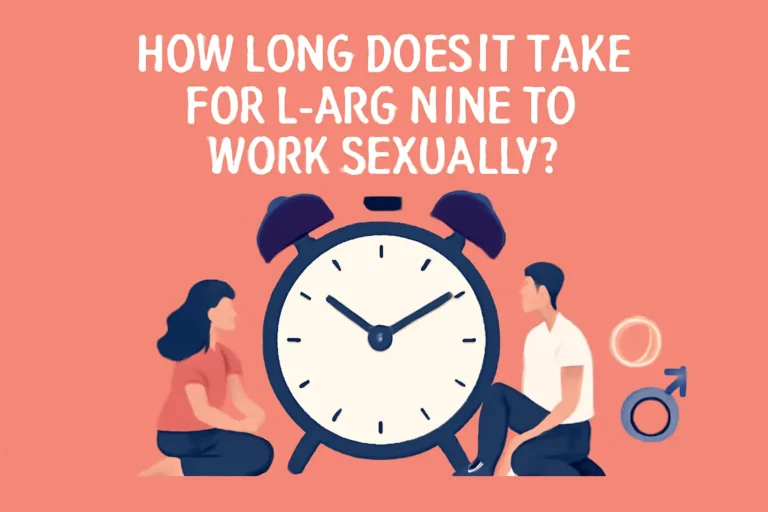How Long Does It Take for Melatonin to Work
Melatonin has gained popularity as a go-to supplement for sleep issues. If you’ve wondered how soon melatonin starts working or how it affects your body, you’re not alone. This guide will walk you through everything you need to know about this natural sleep aid, from onset time to tips for practical use.
Table of Contents
What Is Melatonin?
Melatonin is a hormone produced in the brain by the pineal gland. It signals the body to prepare for sleep, a process tied to your circadian rhythm. Often referred to as the “sleep hormone,” melatonin is a naturally occurring substance in your body, but it can also be taken as a supplement to aid sleep.
Unlike some sleep medications, melatonin is not a sedative. Instead, it helps regulate your sleep-wake cycle, making it easier for your body to transition to sleep.
How Does Melatonin Work?
Melatonin production increases in response to darkness and decreases when exposed to light. This natural rhythm helps coordinate your body’s sleep schedule. When you take melatonin supplements, they mimic the hormone’s effects and encourage your body to feel sleepy at the right time.
The primary goal of melatonin is to assist your body in falling asleep, but it doesn’t force sleep. Instead, it “sets the stage” for sleep by aligning your internal clock.
Factors Influencing Melatonin Effectiveness
Melatonin’s effects can vary based on specific personal and environmental factors, including:
- Age: Melatonin levels tend to decrease as you age, making supplements potentially more effective for older adults.
- Body Weight: Heavier individuals may require a higher dose for the same effect.
- Timing: The time you take melatonin plays a significant role in how quickly it works.
- Light Exposure: Bright light exposure before bed can suppress melatonin production.
- Health Conditions: Conditions like insomnia or obstructive sleep apnea may reduce melatonin’s effectiveness.
How Long Does It Usually Take for Melatonin to Work?
On average, melatonin begins to work within 30 minutes to 1 hour of ingestion. However, the exact time can vary depending on individual differences and the form of melatonin you use (liquid, tablet, or extended-release).
For example:
- Immediate-release melatonin works faster, often within 30 minutes.
- Extended-release melatonin releases gradually, taking longer to kick in but providing sustained effects.
Dosage Guidelines for Melatonin
When it comes to melatonin, less is often more. Most experts recommend starting with a low dose and adjusting as necessary.
- For First-Time Users: Start with 0.5 mg to 1 mg.
- For Adults: Doses typically range from 2 mg to 5 mg for sleep-related issues.
- For Children (consult a doctor first): Doses are usually much lower, between 0.5 mg and 1 mg.
Taking more than necessary won’t speed up the effects and could lead to side effects like headaches or grogginess.
Timing Your Melatonin Dosage
The timing of your melatonin dose is as vital as the dosage itself. For general insomnia, it’s best to take it 30 to 60 minutes before your intended bedtime. If you’re using melatonin to combat jet lag, take it at the target bedtime of your destination.
Timing Recommendations
- For early sleepers who want to delay bedtime: Take melatonin 1 to 2 hours before desired sleep time.
- For night owls trying to sleep earlier, a few hours before bedtime may be effective.
How Age Affects Melatonin’s Effectiveness
Melatonin levels naturally peak during childhood and diminish as you age. Older adults often benefit most from melatonin supplementation as their natural melatonin production decreases.
Melatonin and Seniors
Studies suggest seniors often require higher doses to achieve the same effects. Immediate-release formulations may also work better for older adults.
Using Melatonin for Jet Lag and Shift Work
Melatonin is not just for occasional sleepless nights; it’s also effective for regulating sleep schedules disrupted by travel and shift work.
- Jet Lag: Start melatonin the night you travel and continue for a few days after reaching your destination.
- Shift Workers: Supplements can help align sleep if your schedule frequently changes.
Can You Build a Tolerance to Melatonin?
Melatonin is not habit-forming, unlike some sleep aids, so long-term use typically does not result in tolerance. However, if you rely on it excessively, it might minimize your body’s ability to produce melatonin naturally. For best results, use melatonin sparingly and pair it with lifestyle changes.
Common Side Effects of Melatonin
Melatonin generally has a good safety profile when used correctly, but side effects can occur. Common side effects include:
- Drowsiness
- Dizziness
- Nausea
- Headaches
If you experience grogginess the next day, try lowering your dose.
Natural Ways to Boost Melatonin Levels
While melatonin supplements are effective, there are several natural methods to enhance your body’s production:
- Limit Blue Light Before Bed: Avoid screens for at least an hour before sleep.
- Maintain a Regular Sleep Schedule: Go to bed and wake up at the same time daily.
- Consume Melatonin-Rich Foods like cherries, tomatoes, and nuts.
- Create a Sleep-Friendly Environment with dim lighting.
Tips to Maximize Melatonin’s Sleep Benefits
- Combine melatonin with good sleep hygiene for optimal results.
- Avoid caffeine and alcohol close to bedtime.
- Keep your bedroom calm, dark, and quiet.
Who Should Avoid Melatonin?
Certain groups should avoid or limit the use of melatonin, including:
- Pregnant or breastfeeding women (consult a doctor first).
- People with autoimmune disorders.
- Individuals are on certain medications like blood thinners or antidepressants.
If you’re unsure, always consult a healthcare provider.
Does Melatonin Work for Everyone?
Melatonin works well for some, but not for everyone. If you don’t experience improvements after a week or two, try other options like cognitive behavioral therapy for insomnia (CBT-I) or consult your doctor about alternative treatments.
FAQs About Melatonin Use
Can I take melatonin every night?
Melatonin is safe for short-term use. For long-term use, consult a healthcare professional.
What happens if I take too much melatonin?
High doses can cause grogginess, headaches, or nausea but are unlikely to cause harm.
Does melatonin help you stay asleep?
Extended-release versions can provide support for staying asleep, as opposed to just falling asleep.
When should I stop taking melatonin?
Once your sleep schedule is regulated or if you experience adverse effects, consider stopping.
Is melatonin safe for kids?
It can be safe in small doses but always consult a pediatrician first.
How long does melatonin stay in your system?
Melatonin typically stays in your body for 4–6 hours, depending on metabolism and dosage.
By using melatonin correctly and combining it with healthy sleep habits, you can improve the quality of your rest and better support your overall well-being.







